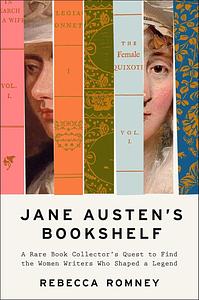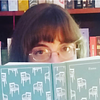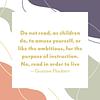Take a photo of a barcode or cover
informative
medium-paced
Moderate: Child death, Chronic illness, Domestic abuse, Infidelity, Sexism, Xenophobia, Religious bigotry, Pregnancy, Classism
informative
inspiring
reflective
medium-paced
I am always reading an Austen novel - just my "getting ready for bed" habit. I started in 2019 and eventually realized every time I reread, different parts interest me, characters I've overlooked jump out, and there are a ton of other books mentioned in them! A few years ago, I started to wonder if I should read Lovers' Vows or Udolpho myself. To date, I haven't pursued this, but hearing about Rebecca Romney's similar endeavor on the Austen Chat podcast, I immediately added this book to my TBR and started searching my local library.
This book didn't disappoint. In fact, it exceeded my expectations (which were fairly high based on the podcast interview!). The author's writing kept the exploration into the books mentioned interesting and I didn't know that being a rare book dealer could be so fun!
I find so much joy in reading. And with Jane Austen's Bookshelf, I got joy in reading about reading!
This book didn't disappoint. In fact, it exceeded my expectations (which were fairly high based on the podcast interview!). The author's writing kept the exploration into the books mentioned interesting and I didn't know that being a rare book dealer could be so fun!
I find so much joy in reading. And with Jane Austen's Bookshelf, I got joy in reading about reading!
hopeful
informative
inspiring
reflective
slow-paced
A book that doesn’t just teach you about women writers who influenced Jane Austen, but also about how the literary canon and rare book dealing function.
informative
inspiring
reflective
medium-paced
informative
inspiring
challenging
emotional
funny
hopeful
informative
inspiring
reflective
sad
medium-paced
Bottom line: If you’re truly an Austen fan, you owe it to her to read this. If you are truly a lover of literature, you owe it to yourself to read this.
This is such a fantastic exploration of 18th c. women authors who many lovers of classic literature have never heard of. Many readers (former me included) assume these other authors must be obscure now because Austen is the best and has outshone them all. Romney turns that assumption on its head by detailing how these women became lesser known — victims of society, really, with some reputations being destroyed while they were still living.
I finished this book about 7:00am and by 10am I was at the largest used book store in my area. I looked for works from each of the authors mentioned. Besides Austen, there was nothing. Then I started to really pay attention to what was on the classic shelves--- very likely 80% or more were male authors. I've got nothing against men but I guarantee you just as many women as men throughout history have <i>written things down</i>. How very very unfortunate that they had to go so long being refused the right to publish and promote their work as widely and as often as men.
While this is not the first book of its kind, it's new to this generation and it's very important. It changed my thinking, for sure, but I'm daring myself to grow. If all of us who love both Jane Austen and literature in general would carry the torch that Romney picked up from those carrying it before her, I think the whole world of classic literature would evolve in a very enriching way.
I'm very interested in reading more from these authors to see what we all have been missing. I stopped multiple times while reading to order books, some rare, some pretty expensive. I found a first edition of Austen's Volume the Third -- an association copy owned by Austen Society contributor, Chris Viveash. It's now the most valuable book in my collection, I believe. So many people are reading this book right now for Jane Austen July— maybe we’ll start a resurgence in interest for these authors and maybe they’ll be republished… wouldn’t that be great?!
There are a lot of interesting tips on book collecting, though she’s also understandably vague on the details. I loved her writing style --- no long tangents about unrelated things to fill pages. Any time she seemed to go off topic, she quickly brought things around to make a well thought out point.
The author can be a bit pretentious-- explaining obvious terms and allusions; assuming the reader is clueless about the things she specializes in (book collecting, publishing world); copious comments about her own education or general intelligence. I found that super annoying as the book went on-- I think it was her attempt at humor but I guess I'm more into self-deprecating than arrogant. That's truly the only flaw I found with her, though. Her information and takeaways were generally spot on.
This is easily the best book I've read so far this year and will serve as a valuable resource for generations to come.
This is such a fantastic exploration of 18th c. women authors who many lovers of classic literature have never heard of. Many readers (former me included) assume these other authors must be obscure now because Austen is the best and has outshone them all. Romney turns that assumption on its head by detailing how these women became lesser known — victims of society, really, with some reputations being destroyed while they were still living.
I finished this book about 7:00am and by 10am I was at the largest used book store in my area. I looked for works from each of the authors mentioned. Besides Austen, there was nothing. Then I started to really pay attention to what was on the classic shelves--- very likely 80% or more were male authors. I've got nothing against men but I guarantee you just as many women as men throughout history have <i>written things down</i>. How very very unfortunate that they had to go so long being refused the right to publish and promote their work as widely and as often as men.
While this is not the first book of its kind, it's new to this generation and it's very important. It changed my thinking, for sure, but I'm daring myself to grow. If all of us who love both Jane Austen and literature in general would carry the torch that Romney picked up from those carrying it before her, I think the whole world of classic literature would evolve in a very enriching way.
I'm very interested in reading more from these authors to see what we all have been missing. I stopped multiple times while reading to order books, some rare, some pretty expensive. I found a first edition of Austen's Volume the Third -- an association copy owned by Austen Society contributor, Chris Viveash. It's now the most valuable book in my collection, I believe. So many people are reading this book right now for Jane Austen July— maybe we’ll start a resurgence in interest for these authors and maybe they’ll be republished… wouldn’t that be great?!
There are a lot of interesting tips on book collecting, though she’s also understandably vague on the details. I loved her writing style --- no long tangents about unrelated things to fill pages. Any time she seemed to go off topic, she quickly brought things around to make a well thought out point.
The author can be a bit pretentious-- explaining obvious terms and allusions; assuming the reader is clueless about the things she specializes in (book collecting, publishing world); copious comments about her own education or general intelligence. I found that super annoying as the book went on-- I think it was her attempt at humor but I guess I'm more into self-deprecating than arrogant. That's truly the only flaw I found with her, though. Her information and takeaways were generally spot on.
This is easily the best book I've read so far this year and will serve as a valuable resource for generations to come.
hopeful
informative
lighthearted
reflective
medium-paced
There has been a lot of buzz surrounding this book, so obviously I was a bit cautious approaching it. I don't want to imply that I am smarter than everyone else, but I do have a deep interest in history, literary history, women's history, fashion history and other more or less niche subjects so I am often left nitpicking certain aspects of a book to death, contemplating whether certain generalization could and should be counted as an error or not. Also, did I mention that I'm a feminist? Well, I am and that often doesn't help with books like this either. (It's the phrasing, it's the presumptions, we won't get into this right now!)
All of this is to say that this book was pretty close to perfect in my opinion. I'm sure others will find faults with it. And that's fine, but for me, I'm more than content!
This book focuses on eight English female writers (nine if we count Jane Austen as well) that wrote before Austen and that Austen loved (aside from one that she maybe didn't, but who is to say) and that inspired her work. Because of this we do get to spent quite a bit of time with each of the authors (about hour and a half in the audiobook, I think) and look at them from different angles we get to hear about their lives on their own, Austen's relation to them and Romney's hunt for copies of their work and her experience of reading them.
I will say that this format might not work for people who wouldn't like Romney's voice, I loved her pretty much immediately and she gets pretty personal in the work, so... you know, something that is good to know. I have to say that seeing her experience all of those authors for the first time made me more excited about starting them on my own and deciding on my priorities. Those were quite unexpectedly some of my favourite bits from the book same as her speaking about rare book collecting and her decisions as she was building her "Jane Austen's Bookshelf".
I also enjoyed learning more about those authors because although I heard about most of them previously (minus two), I didn't really know anything about their lives (aside from Elizabeth Inchbald, but I didn't know much about her either) so this was highly interesting. Throughout the book she also observes how different authors went out of print and why it happened and this was such an interesting addition to the book as well.
Overall, definitely loved it and my TBR isn't thanking me. (Although to be fair, most of those women were on my tbr already, so... not that bad.)
P.S. I forgot to say that she ends this book talking about [book:How to Suppress Women's Writing|1047343] which is the third time someone mentioned this to me this year which I'm taking as a sign that I should *really* read it!
All of this is to say that this book was pretty close to perfect in my opinion. I'm sure others will find faults with it. And that's fine, but for me, I'm more than content!
This book focuses on eight English female writers (nine if we count Jane Austen as well) that wrote before Austen and that Austen loved (aside from one that she maybe didn't, but who is to say) and that inspired her work. Because of this we do get to spent quite a bit of time with each of the authors (about hour and a half in the audiobook, I think) and look at them from different angles we get to hear about their lives on their own, Austen's relation to them and Romney's hunt for copies of their work and her experience of reading them.
I will say that this format might not work for people who wouldn't like Romney's voice, I loved her pretty much immediately and she gets pretty personal in the work, so... you know, something that is good to know. I have to say that seeing her experience all of those authors for the first time made me more excited about starting them on my own and deciding on my priorities. Those were quite unexpectedly some of my favourite bits from the book same as her speaking about rare book collecting and her decisions as she was building her "Jane Austen's Bookshelf".
I also enjoyed learning more about those authors because although I heard about most of them previously (minus two), I didn't really know anything about their lives (aside from Elizabeth Inchbald, but I didn't know much about her either) so this was highly interesting. Throughout the book she also observes how different authors went out of print and why it happened and this was such an interesting addition to the book as well.
Overall, definitely loved it and my TBR isn't thanking me. (Although to be fair, most of those women were on my tbr already, so... not that bad.)
P.S. I forgot to say that she ends this book talking about [book:How to Suppress Women's Writing|1047343] which is the third time someone mentioned this to me this year which I'm taking as a sign that I should *really* read it!
After reading a couple different Jane Austen biographies this year, this seemed like the perfect continuation. I really enjoyed this walk through the works of 18th and 19th century women writers, and the rare book trade and it made me want to learn more about both.
Basically the author questions this idea (which I have heard as long as I’ve read Austen!) that Jane Austen was the first of her kind, and other women either didn’t write, or else just weren’t very good. Romney explores a lot of authors who Austen herself certainly read and enjoyed and in some obvious ways was inspired by, and questions why these others have fallen from the canon (in most cases, misogyny). She really demonstrates to me that you don’t have to put others down to admire one, and it doesn’t make Austen less excellent to show that she was following in the legacy of Burney, Edgeworth, Smith and the others.
I absolutely loved learning about these authors, and I anm excited to read them. Hester Thrale Piozzi and Charlotte Smith had particularly fascinating lives in my opinion, and were able to write despite having about a million children. I think this is an interesting point because I often hear people state confidently that Austen certainly would not have written had she married and had children- but perhaps that is not true and like Piozzi and Smith, she would have made it happen.
Finally, I really loved this peek into the rare book trade. It made me excited to learn more about the old books on my shelves and makes me want to cultivate a more interesting collection. I think that theme really made the book more interesting. I would definitely recommend this book to any Austen or 19th century literature lovers!
Basically the author questions this idea (which I have heard as long as I’ve read Austen!) that Jane Austen was the first of her kind, and other women either didn’t write, or else just weren’t very good. Romney explores a lot of authors who Austen herself certainly read and enjoyed and in some obvious ways was inspired by, and questions why these others have fallen from the canon (in most cases, misogyny). She really demonstrates to me that you don’t have to put others down to admire one, and it doesn’t make Austen less excellent to show that she was following in the legacy of Burney, Edgeworth, Smith and the others.
I absolutely loved learning about these authors, and I anm excited to read them. Hester Thrale Piozzi and Charlotte Smith had particularly fascinating lives in my opinion, and were able to write despite having about a million children. I think this is an interesting point because I often hear people state confidently that Austen certainly would not have written had she married and had children- but perhaps that is not true and like Piozzi and Smith, she would have made it happen.
Finally, I really loved this peek into the rare book trade. It made me excited to learn more about the old books on my shelves and makes me want to cultivate a more interesting collection. I think that theme really made the book more interesting. I would definitely recommend this book to any Austen or 19th century literature lovers!
challenging
dark
emotional
hopeful
informative
inspiring
reflective
sad
slow-paced
informative
inspiring
medium-paced





